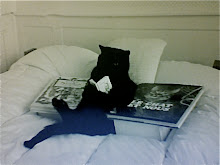Now, I've never read or been tempted to read Nicholas Sparks. I also don't know if I could watch any of the movies without feeling weak from all the sugary sweetness of romanticized cancer. This thread captures the potential and expressive force of the melodrama that Sparks resists (contrary to what he believes, he resists it solely in his defense of his books). And this interview shows just how melodramatic Sparks is in his self-presentation:
"I write in a genre that was not defined by me. The examples were not set out by me. They were set out 2,000 years ago by Aeschylus, Sophocles and Euripides. They were called the Greek tragedies. A thriller is supposed to thrill. A horror novel is supposed to scare you. A mystery is supposed to keep you turning the pages, guessing 'whodunit?'"A romance novel is supposed to make you escape into a fantasy of romance. What is the purpose of what I do? These are love stories. They went from (Greek tragedies), to Shakespeare's Romeo and Juliet, then Jane Austen did it, put a new human twist on it. Hemingway did it with A Farewell to Arms."
That's one of his favorites, and he points it out as he walks the aisles of the bookstore.
"Hemingway. See, they're recommending The Garden of Eden, and I read that. It was published after he was dead. It's a weird story about this honeymoon couple, and a third woman gets involved. Uh, it's not my cup of tea." Sparks pulls the one beside it off the shelf. "A Farewell to Arms, by Hemingway. Good stuff. That's what I write," he says, putting it back. "That's what I write."
I could see myself surreptitiously reshelving Hemingway's novels as "high-brow" romance (whatever that would mean), so Sparks does not convince me. Hemingway's stories, that's a different cup of tea. But self-aggrandizing comparisons aside, Sparks writes romance.
PS: What are your favorite bad books and/or movies?





